Michael J. Roueche's Blog, page 7
April 23, 2013
Lessons from a Year with William Shakespeare
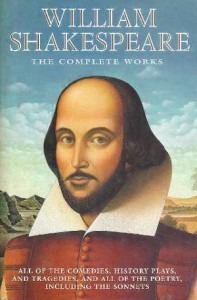 As I write this blog, I’m finishing the first half of my effort to read all of William Shakespeare by his 450th anniversary. At this point, I can’t help but interview myself about what (if anything) I’ve learned and gained in the process. Here are my top thoughts on the experience:
As I write this blog, I’m finishing the first half of my effort to read all of William Shakespeare by his 450th anniversary. At this point, I can’t help but interview myself about what (if anything) I’ve learned and gained in the process. Here are my top thoughts on the experience:
1) I’m grateful I grew up using (and still use) the King James version (KJV) of the Bible. The KJV was produced in Shakespeare’s time using similar language. Being very familiar with the KJV has made reading Shakespeare much easier. I remember one of my kids once saying she was the only one in her high school English class who understood Shakespearean language (because she was the only one who read the KJV). There may be more accurate translations of the bible, and there may be bibles that are easier to read, but there is an elegance in the KJV that doesn’t come through in any other edition. And that elegance is great preparation for reading William Shakespeare.
2) Reading is not the same as watching. I have found it beneficial to watch productions of the plays I’m reading or just finished. The emotion doesn’t necessarily come through as much in reading as in watching it play out before your eyes, but in reading you get all the dialogue and can consider it more carefully. Reading and watching Shakespeare are mutually enhancing. I suspect acting in or directing a production of a Shakespeare play would add an even deeper understanding. (But I have no plans to take up acting.)
3) It is far more work than I anticipated. Fitting it into life has required dedication and consistency. You have to read William Shakespeare when you’re alert. It is tough trying to read it just before going to sleep in the evening.
4) Reading the plays is getting easier. I’m finding it doesn’t take as much concentration now to follow the play as it did in earlier plays. (Although it may be that the histories I’m reading now are just easier to follow than the comedies which I read early on.)
5) I have a greater respect for the combination of Shakespeare’s output and his wisdom. He wrote nearly 40 plays in 25 years. And he wrote them well, full of wonderful prose and poetry and enduring wisdom. Others have met his output, but fallen short of his craft.
6) I can’t imagine now that I’ll ever finish William Shakespeare. I’ll have read all his plays by the end by his next birthday a year from now, but I suspect I’ll be reading and watching him for years to come.
7) I generally can’t excited about many of the fool and clown characters, but two notable exceptions are Falstaff and Autolycus from “The Winter’s Tale.” I’ve discovered I like the dark comedies far more than the lighter ones, and I don’t like fairies and spirits.
I’d celebrate the half-way point further, but I don’t have time–I’ve got to get back to reading.
The post Lessons from a Year with William Shakespeare appeared first on Michael J. Roueche.
April 22, 2013
Pronghorn: An Ocean Away from Antelope at Play

With keen eyesight, Pronghorn watch me as I take their picture.
On the way home from Church yesterday, we happened upon what I think is one of the most interesting animals in the US. It was a small herd of pronghorn (or sometimes inaccurately called “antelope”) grazing by the side of the road. We stopped and took a few photos. They even put on for us a short demonstration of their running ability. At the moment I switched my point-and-shoot camera from photo setting to video, they broke into a short run. Now I’m counting them as not only very interesting, but as also very cooperative.
Ten Quick Pronghorn Facts:
1) Second Fastest Land Animal: They can lope at speeds up to 60 miles per hour. At that rate, they easily outdistance current predators (wolves, bobcats, coyotes), except license-carrying man.
2) “Marathon runners”: They are able to maintain speeds of 35 mph for four mile stretches—that’s four miles in less than 7 minutes.
3) A quintessential symbol of the North American Plains: They are native only to the “high plains and sage flats of the American West.”
4) Horned not antlered: Both male and female of the species have horns. The male’s horns are much more developed and each separates into two—if you can image it—“prongs.”
5) Saved from extinction: Their population had dropped from an estimated 35 million to an early 20th century low point of 13,000. With a stable population of about 700,000, they are now included among the animals of “least concern” on the authoritative threatened species “Red List,” with a stable population of about 700,000.
6) Sole survivor: They are the only remaining member of the Antilocapridae family.
7) Shedding annually: Pronghorn sport horns (not antlers), but shed the horn sheaths annually.
8) Pronghorn don’t jump!: Unless under severe duress, they won’t even try a three-feet high fence, even if in some cases they’re starving and there’s food visible on the other side. They have been known, however, to run under fences at rapid speeds.
9) Tremendous eyesight: Some claim they can see movement three miles away.
10) No such thing as an antelope: There are no antelope in the Americas (contrary to the song) and never have been in the wild.
Sources (all retrieved on 4/22/2013):
International Union for Conservation of Nature and Natural Resources: http://www.iucnredlist.org/details/1677/0
Wikipedia: http://en.wikipedia.org/wiki/Pronghorn
National Geographic: http://animals.nationalgeographic.com/animals/mammals/antelope/
Internet Center for Wildlife Damage Management: http://icwdm.org/handbook/mammals/PronghornAntelope.asp
National Wildlife Federation: http://www.nwf.org/wildlife/wildlife-library/mammals/pronghorn.aspx
Great Plains Nature Center: http://www.gpnc.org/pronghor.htm
The post Pronghorn: An Ocean Away from Antelope at Play appeared first on Michael J. Roueche.
April 9, 2013
Henry V as a Bad Actor, or is He Just Bad
Shakespeare’s Henry V is behind me in my quest to read all of Shakespeare. I did like it, but I still don’t like Henry.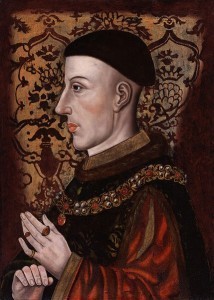
He’s moved from being dissipated, feigned friend Prince Hal (Henry IV, pt 1),
to dedicated Prince Hal hero of battle (Henry IV, pt 1),
to King Hal who abandons former friends and embraces those he detested (Henry IV, pt 2),
to (Henry V) King Hal
who upon slight pretense tears husbands from wives, fathers from children to go “aconquering” in France,
who slaughters the French soldiers (and in real life starves French women and children),
who then woos the French princess assuring her he is no enemy of France, but indeed the friend of France, “for I love France so well that I will not part with a village of it.” (The last part I believe.)
There is a pattern in Shakespeare’s Hal. I heard from someone—I think it was Peter Saccio–that Hal is essentially an actor, taking on these new roles and personae. He apparently is great at the theater, but I wouldn’t want to be his friend. He uses Falstaff and his friends; he uses his father; he uses the ecclesiastical leaders (and they use him); he uses the men and families of England; and finally he uses the princess Catherine.
For all his great speeches and his daring dos, he is not a sincere human being. He gets everything he wants, but like many uncontrollably ambitious people, he leaves behind ruin. I can only look forward to Henry VI to be rid of him.
There are some famous high points, especially Henry V’s speech to rally his men against horrible odds at Agincourt on the day celebrating two legendary (legendary in the sense they probably never existed) Saints Crispin and Crispinian. But Henry’s compelling, patriotic words (see the end of blog) contrast with the more realistic words of Williams, a soldier in the King’s army. As the King—incognito—visits his soldiers in their camps, they await and speak of the coming morning and accompanying coming battle. Williams tells the unrecognized King (in a quote I used at the end of Beyond the Wood),
But if the cause be not good, the king himself hath a heavy reckoning to make when all those legs and arms and heads, chopped off in a battle, shall join together at the latter day and cry all, We died at such a place; some swearing; some crying for a surgeon; some upon their wives left poor behind them; some upon the debts they owe; some upon their children rawly left. I am afeared there are few die well that die in a battle; for how can they charitably dispose of anything when blood is their argument? Now, if these men do not die well, it will be a black matter for the king that led them to it; who to disobey were against all proportion of subjection.
The words would have burned the heart of a noble, thoughtful, self-examining soul. But Henry V was no noble soul and self-interest his crest. In response, he can only complain that anyone would blame him for the state of the soul of a man who dies in battle. He assures Williams it is the soldier’s duty to clear his soul with God.
At the end of Henry IV, Shakespeare promised the popular Falstaff would appear in Henry V. He keeps his promise, sort of. We hear of him dying, “the King has killed his heart,” and we hear an informal eulogy by his friends, but we neither see nor hear him directly. But Shakespeare has been redeemed by Kenneth Branagh. In his 1989 film adaptation, Branagh borrows scenes from Henry IV to bring Falstaff into the play. I actually like the film better than the play. Henry is more heroic, the language clear, the emotion strong. I think it’s a film non-Shakespeare lovers can enjoy.
Words that came to my mind as I read the play and watched two different film adaptations were horrors of war, the destruction a King could do, flimsy excuses for war, confusing patriotism with government self-interest and substituting pride for the needs of the people.
A middling three Bards is all I can muster for King Hal:

Quotes I like for various reasons:
Henry V (in hypocrisy): Therefore take heed how you impawn our person, how you awake the sleeping sword of war: We charge you, in the name of God, take heed; for never two such kingdoms did contend without much fall of blood; whose guiltless drops, are every one a woe, a sore complaint ‘Gainst him whose wrongs give edge unto the swords that make such waste in brief mortality.
Pistol: Knocks go and come; God’s vassals drop and die; and sword and shield in bloody field doth win immortal fame. Boy: Would I were in an alehouse in London! I would give all my fame for a pot of ale and safety.
Boy: But his few bad words are matched with as few good deeds….
Boy: They would have me as familiar with men’s pockets as their gloves or their handkerchers: which makes much against my manhood, if I should take from another’s pocket to put into mine.
MacMorris: The town is beseeched, and the trumpet call us to the breach; and we talk and…do nothing: ’tis shame for us all: …’tis shame to stand still; it is shame, by my hand; and there is throats to be cut, and works to be done; and there ish nothing done….
Orleans: Ill-will never said well.
Boy: The empty vessel makes the greatest sound.
Fluellen: I need not be ashamed of your majesty…so long as your majesty is an honest man.
King Henry V: Praised be God, and not our strength, for it!
Williams: All offences, my liege, come from the heart.
King Henry V: A good leg will fall; a straight back will stoop; a black beard will turn white; a curled pate will grow bald; a fair face will wither; a full eye will wax hollow: but a good heart, Kate, is the sun and the moon; or rather, the sun, and not the moon—for it shines bright and never changes, but keeps his course truly.
King HenryV (extracted from MIT):
If we are mark’d to die, we are enow
To do our country loss; and if to live,
The fewer men, the greater share of honour.
God’s will! I pray thee, wish not one man more.
By Jove, I am not covetous for gold,
Nor care I who doth feed upon my cost;
It yearns me not if men my garments wear;
Such outward things dwell not in my desires:
But if it be a sin to covet honour,
I am the most offending soul alive.
No, faith, my coz, wish not a man from England:
God’s peace! I would not lose so great an honour
As one man more, methinks, would share from me
For the best hope I have. O, do not wish one more!
Rather proclaim it, Westmoreland, through my host,
That he which hath no stomach to this fight,
Let him depart; his passport shall be made
And crowns for convoy put into his purse:
We would not die in that man’s company
That fears his fellowship to die with us.
This day is called the feast of Crispian:
He that outlives this day, and comes safe home,
Will stand a tip-toe when the day is named,
And rouse him at the name of Crispian.
He that shall live this day, and see old age,
Will yearly on the vigil feast his neighbours,
And say ‘To-morrow is Saint Crispian:’
Then will he strip his sleeve and show his scars.
And say ‘These wounds I had on Crispin’s day.’
Old men forget: yet all shall be forgot,
But he’ll remember with advantages
What feats he did that day: then shall our names.
Familiar in his mouth as household words
Harry the king, Bedford and Exeter,
Warwick and Talbot, Salisbury and Gloucester,
Be in their flowing cups freshly remember’d.
This story shall the good man teach his son;
And Crispin Crispian shall ne’er go by,
From this day to the ending of the world,
But we in it shall be remember’d;
We few, we happy few, we band of brothers;
For he to-day that sheds his blood with me
Shall be my brother; be he ne’er so vile,
This day shall gentle his condition:
And gentlemen in England now a-bed
Shall think themselves accursed they were not here,
And hold their manhoods cheap whiles any speaks
That fought with us upon Saint Crispin’s day.
Next Up: It’s No Surprise–King Henry VI, Part One
The post Henry V as a Bad Actor, or is He Just Bad appeared first on Michael J. Roueche.
April 2, 2013
In Defense of Jay Leno; or Why I Like Jay Leno
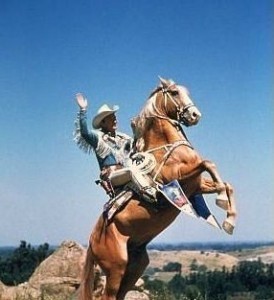
Roy Rogers on his faithful horse Trigger.
With the country being showered with rumors that Jay Leno’s Tonight Show contract won’t be renewed, and with he and Jimmy Fallon now launching their own production of West Side Story, I’ve thought several times in the last few weeks of why I like Jay Leno.
It all goes back to Philadelphia about 30 years ago. At the time, I worked for a company that owned the regional fast food chain named for television and movie singing cowboy Roy Rogers. (The chain, by the way, had great product, specifically an outstanding roast beef sandwich. I believe there still are a few restaurants around, but I don’t know if they have the roast beef sandwiches.)
During the early ’80s, the kids who had grown up watching reruns of Roy Rogers and Dale Evans’ television show on Saturday mornings were reaching their prime in the media, and Roy had strong media (and customer) appeal. (Another aside: Roy Rogers was a very kind, humble man. In my limited exposure to him, I was always amazed at how down to earth he was.) We took Roy “on tour” visiting media and restaurants in markets from Virginia to Connecticut. As part of several of those tours, we visited Philadelphia, and at least on one occasion, we booked him on a popular morning television news and interview show called AM Philadelphia.
Roy finished what I’m sure was (although I can’t remember it) a pleasant interview, and we were walking out of the studio when someone directed our attention to a monitor for the interview of the next guest. It was a young comedian named Jay Leno. I don’t think I’d heard of him before. But he was dressed in an employee uniform from a Roy Rogers Restaurant.
Leno, when he’d heard Roy would be on the show, had gone to a local restaurant and convinced the local manager to give him a uniform to wear for his appearance. I don’t remember what Leno said in the interview, and I don’t think we had time to stay to hear much of it. But I still remember his foresight, initiative, creativity and ability to listen to and then to tap into what was going on around him. It’s no wonder he’s done so well for so long, and no matter what happens with his contract, I wish him well and, of course, “Happy Trails.”
The post In Defense of Jay Leno; or Why I Like Jay Leno appeared first on Michael J. Roueche.
March 25, 2013
Choosing Between Royal Duty and Friends, or is it Simple Betrayal?
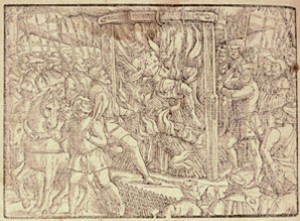
Shakespeare based his very comic character Falstaff on very serious Sir John Oldcastle, protector of the Lollards. His former friend Henry V had him burned to death for it.
I finished the 18th play in my effort to read all the Bard by the Shakespeare 150th anniversary, but I’m falling rapidly behind the calendar. From the number of plays I’ve read, I’m doing OK. The problem is the length of the plays. It seems—and I had no clue when I began—that the plays I’ve read are, on the average, shorter than the plays I have yet to read. According to an interesting word-count calculator, I’ve read 352,669 Shakespeare words in the first 11 months, but still have 928,913 words left to read in the next 13. I hope they’re short words! And that doesn’t include the poems and sonnets. I’ve got to hustle to get it done in time.
With that overall report (or confession) complete, I turn to Henry IV, Second Part. I wish I didn’t have to. This play does not rate as a favorite. It seemed long, comprised of long speeches. And most disappointingly, the Falstaff of Second Part does not live up to the First Part Falstaff. It’s sad to watch this great wit fade. Maybe it’s the result of too much alcohol over the years. Clearly his earthly appetites and irresponsibility seem to have taken a toll on him.
His decline contrasts with the rise of his “friend” Prince Hal. It’s the intersection of Falstaff’s decline and the moment of his expected greatest triumph– Hal’s rise to the throne–that reveals both. As the usurper Henry IV dies and Hal is raised King Henry V, Falstaff’s exuberant joy and expectations peak. Surely the new king will reward all Falstaff’s friends for past association. But it’s not to be. Hal, now in his “role” as king of the realm, true to his faithfully feigning self, denies Falstaff recognition and reward. Is it betrayal of friend for office? Or, could it be leaving behind the irresponsibility of youth for the burdens of leadership? With Hal, I’m convinced it’s the former. (Perhaps Shakespeare felt it the latter.) So far, Henry V, as was the case with Prince Hal, is not a favorite character.
One of the moments of valor (perhaps the only one) in the play was the speech of the Chief Justice, who so often in the past, served as enforcing policeman to Prince Hal. When challenged by the new king who clearly craves revenge against this minster of Henry IV’s wishes, the Chief Justice reminds the new Henry that he was acting on behalf of his royal father. “Question your royal thoughts, make the case yours; be now the father, and propose a son; hear your own dignity so much profane’d, see your most dreadful laws so loosely slighted, behold yourself so by a son disdain’d; and then imagine me taking your part, and, in your power, soft silencing your son; after this cold considerance, sentence me….” Contrasting again with his rejection of Falstaff, Henry V accepts, embraces and reappoints the Chief Justice.
Falstaff and Hal use each other. Prince John deceives the rebels into peace and their own deaths. The rebels use light excuse to make war. Besides the Chief Justice, I didn’t see any good guys in Shakespeare’s King Henry, Second Part.
Words that come to mind when I read Henry IV, Second Part are betrayal, rumor, rebellion, treachery/deceit.
I happily give Henry IV, Second Part one lowly Bard:

Quotes I liked for various reasons:
Rumour: Open your ears; for which of you will stop the vent of hearing when loud Rumour speaks?
Rumour: Upon my tongues continual slanders ride, the which in every language I pronounce, stuffing the ears of men with false reports. I speak of peace, while covert enmity, under the smile of safety, wounds the world….
Rumour: Rumour is a pipeblown by surmises, jealousies, conjectures….But what need I thus my well-known body to anatomize among my household.
Northumberland: …The first bringer of unwelcome news hath but a losing office.
Morton: My lord your son had only but the corpse, but shadows and the shows of men, to fight: For that same word, rebellion, did divide the action of their bodies from their souls; and they did fight with queasiness, constrain’d, as men drink potions; that their weapons only seem’d on our side, but, for their spirits and souls, this word, rebellion, it had froze them up, as fish are in pond.
Morton: But now the archbishop turns insurrection to religion….
Morton: Never so few, and never yet more need.
Falstaff: I am not only witty in myself, but the cause that wit is in other men.
Falstaff: …It is the disease of not listening, the malady of not marking, that I am troubled withal.
Falstaff: I am as poor as Job, my lord, but not so patient….
Chief Justice: You are as a candle, the better part burnt out.
Chief Justice: Have you moist eye? A dry hand? A yellow cheek? A white beard? A decreasing leg? An increasing belly? Is not your voice broken? Your wind short? Your chin double? Your wit single? And every part about you blasted with antiquity? And will you yet call yourself young? (Capturing the image of “old age”?)
Chief Justice: …I am well acquainted with your manner of wrenching the true cause the false way.
Prince Henry: …Midwives say the children are not in the fault.”
King Henry IV: Uneasy lies the head that wears a crown.
Warwick: Rumor doth double, like the voice and echo….
Falstaff: Master Silence, I will not use many words with you. …I do see the bottom of Justice Shallow.
Archbishop: I have in equal balance justly weigh’d what wrongs our arms may do, what wrongs we suffer, and find our griefs heavier than our offenses. (Ever the excuse for rebellion.)
Hastings: And though we here fall down, we have supplies to second our attempt: If they miscarry, theirs shall second them; and so success of mischief shall be born, and heir from heir shall hold this quarrel up whiles England shall have generation. (The promise of and hope for continual rebellion: English version of Hatfields and McCoys with a crown thrown in.)
Archbishop: A peace is of the nature of a conquest; for then both parties nobly are subdued, and neither party loser.
Falstaff: …He saw me, and yielded; that I may justly say with the hook-nosed fellow of Rome,—I came, saw, and overcame.
King Henry IV: How quickly nature falls into revolt when gold becomes her object.
King Henry IV: O foolish youth! Thou seek’st the greatness that will overwhelm thee.
King Henry V: I know thee not, old man: fall to they prayers; how ill white hairs become a fool and jester! I have long dream’d of such a kind of man, so surfeit-swell’d, so old, and so profane, but, being awake I do despise my dream…Presume not that I am the thing I was; for God doth know, so shall the world perceive, that I have turn’d away my former self. (The words of personal betrayal, not repentance.)
Dancer (epilogue): I was lately here in the end of a displeasing play, to pray your patience for it, and to promise you a better. (I hope so. It’s just too bad it’s named after Prince Hal become king.)
Dancer (epilogue): Our humble author will continue the story, with Sir John [Falstaff] in it, and make you merry with fair Katherine of France: where, for anything I know, Falstaff shall die of a sweat, unless already he be killed with your hard opinions…. (A bit of false advertising and foreshadowing.)
Next Up: King Henry V (if you’re reading along)
The post Choosing Between Royal Duty and Friends, or is it Simple Betrayal? appeared first on Michael J. Roueche.
March 19, 2013
A Yankee Poet, A Southern General, A Civil War Novel
Some say the world will end in fire,
[image error]
American poet Robert Lee Frost was named for Confederate General Robert E. Lee.
Some say in ice.
Thus begins a poem of quintessential “New England Poet” Robert Frost that certainly could have been used to describe the Civil War. But I doubt it was.
So, you ask, “Why are you blogging about the Civil War and Robert Frost who was born nearly a decade after the war ended?
Frost’s complete identity, like his poetry, isn’t necessarily obvious on the surface, and that northern farmer who tinkered ineffectively tilling Yankee soil was actually named Robert Lee Frost, named for Robert E. Lee, Confederate Civil War hero and general.
Besides the Civil War connection, I have long been a fan of the poet and am using an excerpt from one of his poems in my new Civil War novel “A River Divides,” sequel to “Beyond the Wood.”
A Yankee poet named for a Confederate icon? How can that be? Simple: We don’t get to name ourselves.
Robert Lee Frost was born not in New England, but in San Francisco March 26, 1874 to a father and mother who had migrated from New England. Frost’s father, supposedly fed up with the Republican policies of New England, moved his family west. There, he edited a Democratic-Party-supporting newspaper and was a proud “Copperhead, a southern sympathizer and champion of States rights.”
The poet was 10 when his father died of tuberculous in California, and his school-teacher mother moved with her two sons back to New England. Interesting in view of the obsession that later generations would have with introducing children to reading as soon as possible, Frost’s mother read to the youngster, but he “was fourteen…before he began to read on his own.”
Another Frost surprise was that he was published first outside the US. Frost’s grandfather, concerned about a grandson dedicated to making a living as a poet, gave him a farm in New Hampshire as a refuge. But in 1912, Frost sold the farm and with his family crossed the Atlantic to the “English countryside, in Buckinghamshire.” It was there, at age 38, that the future four-time Pulitzer Prize winner, published his first book, using poems he had written over 20 years.
Character-Revealing Frost Anecdote
Frost was a poet and a teacher. On one occasion, he gave the boys in his charge the assignment to “write something, anything, that interested them.” When he received the papers, he asked if any student wanted to keep what he’d written. When no one indicated they wanted their papers, he “’threw them unread into the waste basket while the class looked on. If they didn’t care enough for the themes to keep them, I didn’t care enough for the themes to read them,’” he later wrote.
Several Insightful Frost Quotes
“The only Education worth anything is self-education.”
“People who read me seem to be divided into four groups: 25 percent like me for the right reasons; 25 percent like me for the wrong reasons; 25 percent hate me for the wrong reasons; 25 percent hate me for the right reasons. It’s that last 25 percent that worries me.”
“All men are born free and equal—free at least in their right to be different. Some people want to mix up the weak and strong of mankind; they want to homogenize society everywhere. That’s why I’m against the homogenizers in art, in politics, in every walk of life. I want the cream to rise.”
A few of my favorite poems from Robert Frost
(All of these poems are annotated or hand listed in my copy of “The Pocket Book of Robert Frost’s Poems” which I used in Mr. Withers’ interesting second period English class at McLean High School in Virginia decades ago.)
Stopping by Woods on a Snowy Evening
Out, Out— (Nice allusion to Shakespeare)
Which poem is used in my new Civil War novel? You have to wait a little longer to find out.
Most information and all non-poetry quotes for this blog came from a speech given by Frost friend and scholar Louis Untermeyer. Untermeyer, Louis. Robert Frost: A Backward Look. Washington: US Printing Office. 1964. Print.
The post A Yankee Poet, A Southern General, A Civil War Novel appeared first on Michael J. Roueche.
March 11, 2013
Couldn’t Shakespeare Come Up With A “Catchier” title?
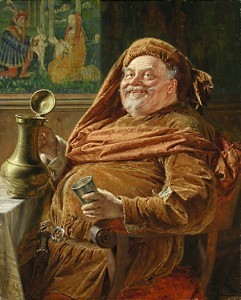
Falstaff, an amazing Shakespeare creation, dominates King Henry IV, First Part.
Shakespeare’s King Henry IV First Part is a great showcase for all things Falstaff. The play is the 17th in my effort to read the Bard by the Shakespeare 450th, and I really liked it–everything that is except the play’s name.
Perhaps Sir Jack is a strange character to start with when writing about the play, but his presence is huge (physically, of course, but morally as well). His slippery rejection of social rules overshadows the “acceptable” and “honor-based” struggle for power and dominion, death and war among royalty and elite.
This is not the pathetic, buffoonish, butt-of-the-joke Falstaff foisted on the characters of The Merry Wives of Windsor. This Falstaff is clever, witty, selfishly philosophical. He’s able to escape physical danger by effortlessly feigning death and able to twist less dangerous events to his advantage with his finely honed tongue—his weapon of choice.
His “wasp-tongue” spouts, along with the tongues of several other characters, an encyclopedia of insults. Insult exchanges between Falstaff and his friend Prince Henry remind me of the adolescent name-calling exchange in that classic baseball and Americana movie The Sandlot when the ball-playing heroes confront an arrogant opposing team. Maybe it’s even more indicative of contemporary internet “discussions” and politics that substitute name-calling for exchange of ideas and opinion. (For the fun of it, I’ve listed below some of the play’s insults. For the full Shakespeare insult treatment, you can also visit Ye Olde Official Shakespeare Insult Kit.)
Respect, Falstaff may not merit; but for the moral dilemmas and entertainment he presents, Falstaff captures our attention.
I have a harder time understanding and believing in his periodic companion in debauchery, Price Henry. It seems unlikely that this prince can join Falstaff in dissipation, then instantly rise heroic to save the kingdom. I know he explains it’s all part of his plan to make his royal rise all the more spectacular for the people. But I suspect that under most circumstances, dissipation only leads to further dissipation, and rarely to instant redemption and perfection.
But heroic, the prince does become in the righteous endeavor of saving his father. His father is the very Bolingbroke (now King Henry IV) who earlier usurped the kingdom of Richard II and had that king killed. It’s no wonder that he now fears and battles those who helped him in his ascent.
Words that came to mind as I read the play are rebellion and pride are folly.
King Henry IV First Part, on the backs of Prince Henry and Falstaff, earns five Bards:

Quotes I liked for various reasons:
Prince Henry: …Wisdom cries out in the streets, and no man regards it.
Prince Henry: …He will give the devil his due.
Prince Henry: If all the year were playing holidays, to sport would be as tedious as to work….
Hotspur: I will ease my heart, albeit I make a hazard of my head.
Northumberland: Why, what a wasp-tongue and impatient fool art thou…tying thine ear to no tongue but thing own!
1st Carrier: …It was the death of him.
Prince Henry: Ill-weav’d ambition, how much art thou shrunk! When that this body did contain a spirit, a kingdom for it was too small a bound; but now two paces of the vilest earth is room enough…
Falstaff: …A plague upon’t, when thieves cannot be true to one another.
Falstaff: The better part of valour is discretion… (Said by a character who epitomizes cowardice.)
Selected insults (there were more, believe it or not) from various characters. Don’t try these at home without adult supervision or explanation:
Ye fatguts
Lack-brain
Gorbellied knaves
Fat chuffs
Mad-headed ape
Woolsack
Round man
Clay-brained guts
Nott-pated fool
Obscene, greasy, tallow-keech
Sanguine coward
Bed-presser
This horse back-breaker
Huge hill of flesh
Starveling
Elf-skin
Dried neat’s tongue
You stockfish
Tailor’s yard
You sheath
You bow-case
You vile standing-tuck
Good pint-pot
Good tickle-brain
Trunk of humours
Bolting-hutch of beastliness
Swollen parcel of dropsies
Huge bombard of sack
Stuffed cloak-bag of guts
Reverend vice
Gray iniquity
Father ruffian
Vanity in years
Smiling pick thanks
Base newsmongers
Impudent, embossed rascal
Sneak-cup
Next Up (if you’re reading along): King Henry IV, Second Part–a surprise, I’m sure.
The post Couldn’t Shakespeare Come Up With A “Catchier” title? appeared first on Michael J. Roueche.
March 4, 2013
In Praise of a Good Local Newspaper

The Chronicle is part of Colorado Community Media family which garnered 95 awards in statewide competition
Kudos to Parker Chronicle reporter Chris Michlewicz and Colorado Community Media (CCM) for recognition in Colorado Press Association‘s Better Newspaper competition. The Chronicle announced the awards in this week’s edition.
When we first moved to Parker several years ago, one of the things we missed about the Virginia community we left was the local paper. It had been informative and a particularly good place for dialogue among readers—substantive letters to the editor made up a big part of it each week. We quickly found the Parker paper was not as effective. But that has changed in the last year or so.
New ownership at the Parker Chronicle has revamped the newspaper, creating increasingly interesting articles and community relevance. Like most small newspapers, the Chronicle is now part of a larger organization. CCM now owns and operates the paper within its portfolio of newspapers across the state. It apparently knows what it’s doing as improvements at the Chronicle have been impressive and immediate.
Company newspapers received 95 awards in the association’s program. Michlewicz won recognition for his feature about a woman’s book about life with her autistic son. Congratulations, Chris.
Of course, my favorite among Chris’ articles is a feature he did about Beyond the Wood. We appreciated Chris’ article and are glad to see CCM making the Chronicle more meaningful for the community and for us–we’ve used its information several times to enhance our lives during the last year.
A strong local newspaper helps support a vibrant community. Parker is a great town, and it can only be strengthened by this stronger community-focused newspaper.
The post In Praise of a Good Local Newspaper appeared first on Michael J. Roueche.
February 27, 2013
An Absolutely Fun and “Miserable” 2013 National History Day
Abraham, a middle school student, presented his video on Mexican revolutionary Pancho Villa to an audience of two last Saturday at Legend High School in Parker, Colorado.
His family is from the same Mexican state as Villa, and Abraham glowed with enthusiasm and pride as he told the two of us–National History Day regional judges–of the Mexican “Robin Hood.” As we visited with the young filmmaker after seeing his program, we learned Abraham’s father had taught him how to edit video, and Abraham used those skills and his own research to create the documentary.
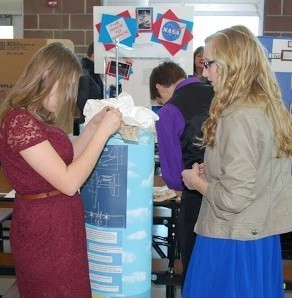
Students Put Final Touches on National History Day Exhibits. (Photo courtesy of Anne Hirt-Pherson)
His presentation was part of the Greater Denver Metro National History Day regional event. I was fortunate to be one of the judges, and while I’m not sure I’ll ever become a Villa fan, I’m definitely rooting for Abraham and for all 322 participants in Saturday’s regional National History Day.
Kory Franken, who heads the Greater Denver Metro event, wrote last December inviting me to join what turned out to be 60 judges for the day. She wrote, the program “is a great way to encourage students to make history relevant.”
Our two-member documentary-judging team spent most of the morning in a classroom as small groups of middle schoolers arrived every 20 minutes. Some came with parents, siblings, teachers and friends. Some came alone.
“Do you have your process paper?” we’d usually prompt as the group arrived. The students would hand us descriptions of why they had chosen their National History Day topic and how they’d done their research. We’d read the papers and accompanying descriptive bibliographies in silence, trying to pick up key details of their project, ignoring commotion made while they set up for their documentaries in an unfamiliar classroom. (Thanks to the technical crew at Legend for responding quickly to several pleas for help during the morning.)
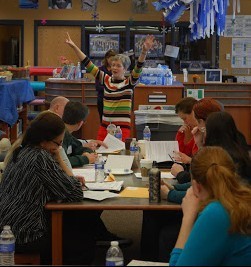
Susan Gustin, Judge Coordinator for Greater Denver Metro History Day and Lecturer, Department of History, University of Colorado Denver, trains judges before event begins. (Courtesy of Anne Hirt-Pherson)
After the five-minute set up, the students, often nervous, would present their up-to-ten-minutes-long documentary. Then we’d visit with them about their film-making motivation. It was clear they loved their experience and their topics: Vietnam—how it changed the voting age; Vietnam—how Special Forces affected the war; the Titanic ensuring the future of lifeboats; World War II and how it changed communications; and more.
After lunch, another judge joined us to focus on high-schooler-created documentaries in the second round of judging, and we enjoyed videos on such topics as Penicillin, the Cold War, Jackie Robinson and separation of church and state.
The award-winning National History Day program is growing. Susan Gustin, who organized and trained the judges, told us the Denver Metro event attracted nearly twice as many entries this year as last. But it doesn’t just include documentaries. The national website notes,
“Students…conduct extensive primary and secondary research through libraries, archives, museums, oral history interviews and historic sites. After analyzing and interpreting their sources and drawing conclusions about their topics’ significance in history, students present their work in original papers, websites, exhibits, performances and documentaries.”
[image error]
Each National History Day has a theme: 2013′s is “Turning Points in History.”
The day was a lot of fun. We left the event with great respect for students who worked hard to research and create projects. But for judges, the day had downsides: Miserable were the assignments to give meaningful and helpful feedback and to choose which documentaries should go to the next level.
I would have loved to have seen all the documentaries, performances, papers, websites and exhibits. Altogether, it must have been an amazing show.
The regional winners have already been chosen. But the announcement was really “incomplete” because anyone who did the research and prepared a project for the event was, by Kory’s definition, a winner. As Kory’s daughter and multiple-year participant explained, National History Day taught her “…respect for the human spirit, and the knowledge that no story is irrelevant.”

Visitors browse National History Day exhibits. (Photo courtesy of Anne Hirt-Pherson)
As with life, the real success comes not in outward praise, glory and reward, but in what we become. National History Day 2013 has already moved dozens of Denver-area students along their path toward becoming better people, citizens and history lovers.
Here’s to all the students who achieved intrinsic success and satisfaction through their involvement. Let’s hope even more students (and schools) will join the effort for 2014, each sharing with all something they’ve researched and learned.
Note: Just for fun and since this year’s entries aren’t yet available, I’ve posted YouTube videos of a few past national award-winning entries:
Florence Nightingale (A Middle School Student Project)
The post An Absolutely Fun and “Miserable” 2013 National History Day appeared first on Michael J. Roueche.
February 26, 2013
Too Much of a Good Thing for King Richard to Keep
Shakespeare wrote two series of historical plays. The first written was the end of the story (think Star Wars). The prequels were written later. Shakespeare’s The Life and Death of King Richard II is the first play in the prequels–so the first of the entire series. These plays focus on the War of Roses–the conflict of power between the Lancaster and York branches of the Plantagenet family. King Richard II specifically focuses on Richard losing the first battle of the war and thus his crown and his life. The war lasted some 30 years with ripples continuing for another decade, but for Shakespeare it lasted eight plays. Richard II is my second historical play in the march to read all of Shakespeare. I much prefer it to King John. Words that capture the message of the play for me are mistreating people is dangerous; power corrupts; even well meaning people are corrupted by power; power makes us selfish and wasteful; allegiance shifts easily from waning power to new power.
In addition to reading the play, I watched a 30-year old, enjoyable production available for streaming through Amazon Prime. I also listened to two lectures on it from Peter Saccio of Dartmouth College that was available as part of the Great Courses series Shakespeare: Comedies, Histories and Tragedies. The Great Courses lectures were available at the local library (and I suspect most libraries carry them).
King Richard II earns five Bards:
Quotes that appealed to me for various reasons (some of the best ones are too long to list here):
Norfolk: Until the heavens, envying earth’s good hap, add an immortal title to your crown! (Translation: “Until you die.” But Shakespeare says it so well.)
King Richard: Let’s purge this choler without letting blood; this we prescribe, though no physician; deep malice makes too deep incision: forget, forgive; conclude, and be agreed; our doctors say this is no time to bleed….
Norfolk: The purest treasure mortal times afford is spotless reputation.
Norfolk: Mine honour is my life; both grow in one; take honour from me, and my life is done….
Norfolk: …Truth hath a quiet breast.
Bolingbroke: …Grief makes one hour ten.
Gaunt: There is no virtue like necessity.
Northumberland: …Hope to joy is little less in joy than hope enjoy’d.
King Richard: For you have but mistook me all this while: I live with bread like you, feel want, taste grief, need friends:—subjected thus, how can you say to me, I am a king?
Bishop of Carlisle: To fear the foe, since fear oppresseth strength, gives, in your weakness, strength unto your foe, and so your follies fight against yourself.
King Richard: He does me double wrong that wounds me with the flatteries of his tongue.
Gardener: They are; and Bolingbroke hath seiz’d the wasteful king.—Oh! What a pity is it. That he had not so trimm’d and dress’d his land as we this garden! We at time of year do wound the bark, the skin of our fruit-trees, lest, being over-proud in sap and blood with too much richness it confound itself: Had he done so to great and growing men, they might have liv’d to bear, and he to taste their fruits of duty. Superfluous branches we lop away, that bearing boughs may live: Had he done so, himself had bourne the crown, which waste of idle hours hath quite thrown down.
King Richard: I’ll read enough, when I do see the very book indeed where all my sins are writ, and that’s myself.
King Richard: ‘Tis very true, my grief lies all within; and these external manners of laments are merely shadows to the unseen grief that swells with silence in the tortur’d soul; there lies the substance….
King Richard: The love of wicked friends converts to fear; that fear to hate; and hate turns one or both to worthy danger and deserved death.
York: But heaven hath a hand in these events, to whose high will we bound our calm contents.
Aumerle: My heart is not confederate with my hand. (Really? Is that possible?)
King Richard: Think that I am unking’d by Bolingbroke, and straight am nothing:—but whate’er I am, nor I, nor any man that but man is, with nothing shall be please’d till he be eas’d with being nothing.
King Richard: …How sour sweet music is when time is broke and no proportion kept! So is it in the music of men’s lives.
King Richard: This music mads me; let it sound no more; for though it have holp madmen to their wits, in me it seems it will make wise men mad. Yet blessing on his hearat that gives it me! For ’tis a sign of love; and love to Richard is a strange brooch in this all-hating world.
King Richard: Mount, mount, my soul! They seat is up on high; whilst my gross flesh sinks downward, here to die. Exton: As full of valor as of royal blood: Both have I spilt;—O, would the deed were good! For now the devil that told me I did well, says that this deed is chronicled in hell.
Bolingbroke: They love not poison that do poison need, nor do I thee: though I did wish him dead, I hate the murderer, love him murdered…I’ll make a voyage to the Holy Land, to wash this blood off from my guilty hand….
Next Up (if you’re reading along): King Henry IV, First Part
The post Too Much of a Good Thing for King Richard to Keep appeared first on Michael J. Roueche.




